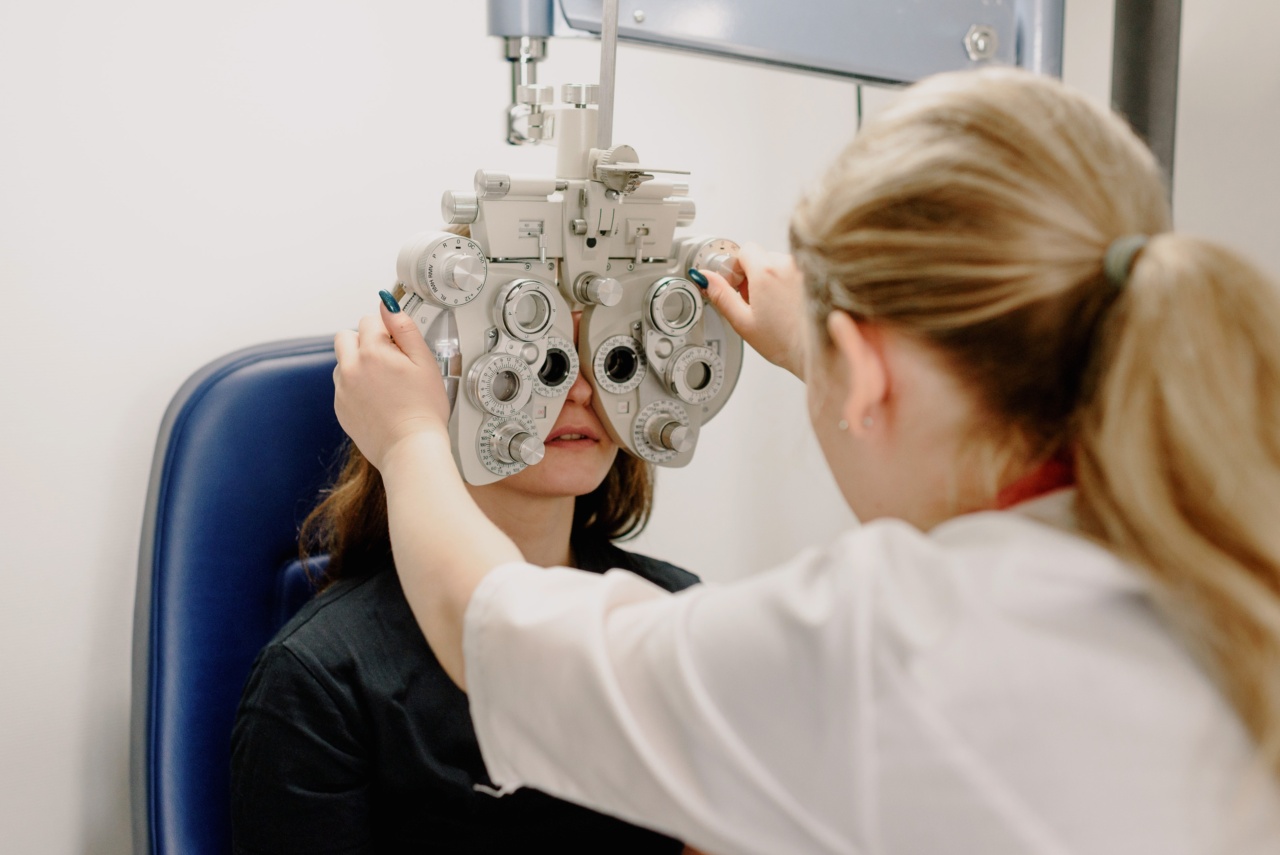Vision is one of the most precious senses we have, allowing us to perceive the beauty of the world and navigate through our daily lives. However, many people take their vision for granted and don’t prioritize its health until problems arise.
Vision loss can have a significant impact on our quality of life, affecting our ability to work, drive, read, and even engage in everyday activities. The good news is that there are simple habits we can adopt to prevent vision loss and maintain optimal eye health.
Understanding Common Causes of Vision Loss
Before we delve into the habit that can help prevent vision loss, it’s essential to understand some of the common causes behind this condition:.
1. Age-related macular degeneration (AMD)
AMD is a leading cause of vision impairment and blindness, especially in individuals over the age of 50. It affects the macula, which is responsible for sharp, central vision.
As AMD progresses, it can make it difficult to recognize faces, read, and perform other tasks requiring detailed vision.
2. Cataracts
Cataracts occur when the natural lens in the eye becomes clouded, resulting in blurred vision. This condition is common among older individuals but can also develop due to genetic factors, trauma, or prolonged use of certain medications.
3. Glaucoma
Glaucoma is a group of eye conditions characterized by damage to the optic nerve, often associated with elevated intraocular pressure. If left untreated, glaucoma can lead to irreversible vision loss.
It is particularly dangerous because it can progress silently without any noticeable symptoms until significant damage has occurred.
4. Diabetic retinopathy
Diabetic retinopathy is a complication of diabetes that affects the blood vessels in the retina. Uncontrolled blood sugar levels can lead to the development of abnormal blood vessels, hemorrhages, and fluid leakage, impairing vision.
5. Refractive errors
Refractive errors, such as myopia (nearsightedness), hyperopia (farsightedness), and astigmatism, affect the way the eyes focus on light. These conditions can cause blurry vision, eye strain, and headaches.
6. Eye injuries
Eye injuries, whether caused by accidents or sports-related activities, can lead to vision loss if not promptly and appropriately treated.
It is crucial to protect your eyes from potential hazards and seek immediate medical attention if an injury occurs.
7. Poor eye care habits
Neglecting proper eye care habits, such as not wearing protective eyewear, excessive screen time, inadequate nutrition, and failure to have regular comprehensive eye exams, can contribute to vision loss over time.
Adopting the Habit: Protecting Your Vision
Now that we understand some of the common causes of vision loss, it’s time to focus on the habit you can adopt to protect your vision:.
1. Eat a Vision-Friendly Diet
Proper nutrition plays a crucial role in maintaining optimal eye health. Including certain foods in your diet can provide essential vitamins, minerals, and antioxidants that support eye function and protect against vision loss.
Some foods rich in eye-healthy nutrients include:.
- Leafy green vegetables (spinach, kale, collard greens)
- Carrots
- Sweet potatoes
- Oranges and other citrus fruits
- Berries (blueberries, strawberries)
- Fatty fish (salmon, tuna)
- Nuts and seeds
By incorporating these foods into your diet, you can nourish your eyes and reduce the risk of age-related vision problems.
2. Wear Sunglasses with UV Protection
Exposure to harmful ultraviolet (UV) rays from the sun can contribute to cataracts and macular degeneration. Therefore, it is essential to protect your eyes by wearing sunglasses that block 100% of UV rays.
Look for sunglasses labeled as having UV 400 or 100% UV protection to ensure maximum safety for your eyes.
3. Take Regular Screen Breaks
In today’s technology-driven world, prolonged screen time has become the norm. However, excessive screen use can lead to digital eye strain, dry eyes, blurred vision, and headaches.
To prevent these symptoms, follow the 20-20-20 rule: every 20 minutes, look away from your screen and focus on something 20 feet away for at least 20 seconds. This simple habit can alleviate strain on your eyes and reduce the risk of long-term vision problems.
4. Practice Good Contact Lens Hygiene
If you wear contact lenses, proper hygiene is vital to prevent infections and complications that can harm your vision.
Always adhere to the instructions provided by your eye care professional regarding cleaning, disinfecting, and replacing your contact lenses. Avoid wearing your lenses for longer than recommended and never sleep with them unless prescribed by your eye doctor.
5. Quit Smoking
Smoking is not only harmful to your overall health, but it also increases the risk of various eye conditions. Studies have shown that smokers are more likely to develop cataracts, macular degeneration, and optic nerve damage.
If you’re a smoker, quitting can significantly improve your eye health and reduce the chances of vision loss.
6. Maintain a Healthy Weight and Blood Pressure
Obesity and high blood pressure are risk factors for several eye conditions, including diabetic retinopathy and glaucoma.
It’s important to maintain a healthy weight and keep your blood pressure within a normal range to reduce the likelihood of developing vision problems.
7. Stay Active and Exercise Regularly
Physical exercise not only benefits your overall well-being but also plays a role in preventing vision loss. Engaging in regular exercise helps improve blood circulation, including to the eyes, ensuring they receive adequate oxygen and nutrients.
Aim for at least 30 minutes of moderate-intensity exercise, such as brisk walking or swimming, on most days of the week.
8. Protect Your Eyes from Injury
Whether you’re engaging in sports, pursuing a DIY project, or working in hazardous environments, protecting your eyes from potential injuries is crucial.
Always wear appropriate protective eyewear, such as safety goggles or glasses, that are designed to shield your eyes from flying objects, chemicals, and other potential hazards.
9. Get Regular Eye Exams
Regular comprehensive eye exams are essential for maintaining eye health and preventing vision loss. Eye exams can detect any potential issues in their early stages, allowing for prompt treatment and intervention.
Make sure to schedule an eye exam with your optometrist or ophthalmologist at least once every two years, or as recommended by your eye care professional.
10. Be Mindful of Family Eye Health History
Some eye conditions have a genetic component, meaning they can be passed down through generations. Being aware of your family’s eye health history can help you understand your risk factors for certain eye conditions.
Inform your eye care professional about any conditions or diseases that run in your family, as this information can guide your eye care and screening.
Conclusion
Your vision health should be treated with the utmost care and attention. By adopting this habit and following these simple guidelines, you can significantly reduce the risk of vision loss and maintain healthy eyes throughout your life.
Remember to prioritize regular eye exams, eat a balanced diet rich in eye-healthy nutrients, protect your eyes from harmful UV rays, and practice good eye care habits. By investing in your eye health today, you can enjoy clear vision and a bright future tomorrow.





























